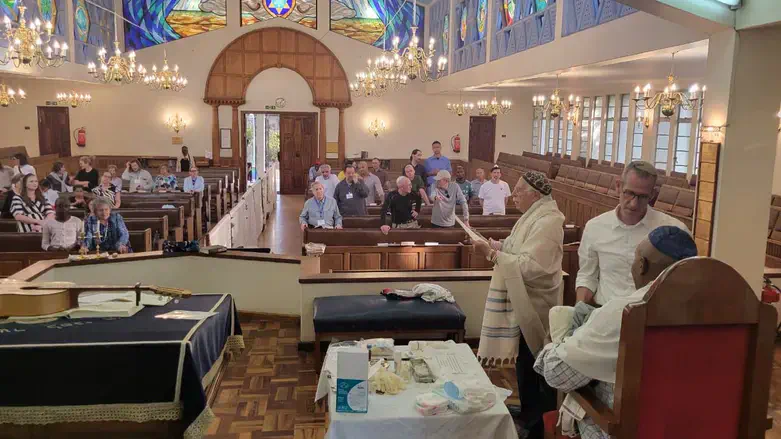
As I looked around the plane and noticed I was one of the only white people on board, the reality of traveling to Kenya started to set in. I’m used to being in the minority whenever I leave Israel, which happens often as a mohel. Wearing a kippah outs you in that way. But this was different. Seeing women in traditional African garb accented the unconventional nature of my voyage. I had never been to Africa, let alone any other third world country, so I had no idea what to expect.
Since the brit milah (ritual circumcision) fell on Friday, I would be required to stay through Shabbat. Although that posed its challenges both for my family-life and the work I do in Israel, the duration of stay would allow me to get a better sense of the area than I normally do.
What I discovered is that Kenyans love Israel. Of course I received the usual stares as I wandered the streets in a kippah. But, surprisingly, the market vendors quoted me prices in Hebrew. The country has experienced its fair share of terrorism. The bombings they suffered are not in the distant past. So, even though much of their news comes from Al Jazeera, the local population stands with Israel and the Jewish people in our fight against Jihad.
The Jewish community of Nairobi is an intimate, inviting group consisting of both locals and some expats from America and Europe. The grounds of the synagogue also house a social hall and a home for the rabbi and his family. Since the congregation would not be able to convene twice on a Friday, nor provide two separate meals for the brit milah and Shabbat, the brit was carried out just before sunset and the traditional meal was combined with Shabbat dinner. This schedule had its stresses because the brit must be finished before sunset, otherwise it would be pushed off until Sunday. In the end, the event was a stirring way to bring in and celebrate the day of rest.
The Jews of Nairobi have a talented, capable rabbinic family who really is a one-stop shop for everything Jewish in the area. The rabbi has spent the past four years teaching the community everything from the ground up. But unlike other far-flung communities I’ve visited, the members functionally participate in ritual life.
The newborn baby was not the only newcomer to the community that weekend. On Shabbat morning, a 90-year-old Holocaust survivor named Max was called to the Torah for the first time. He had lived under the radar of the Nairobi Jewish community for nearly 50 years. The rabbi only connected with Max after an Israeli relative sent him Max’s Go Fund Me page, started by a few Nairobi citizens.
These places are where Judaism truly comes to life. As much as I see the future of the Jewish people living out our manifest destiny in the motherland, those of us who live in Israel have it easy. Whenever we want to, those who keep kosher have a plethora of options for dining out. If I’m frustrated with something my shul does, there are another handful in a five-block radius to choose from. But to lay down roots in a place like Kenya, to lead the Jews there, even for a duration of time, is true commitment.
While I feel blessed to help families experience the ritual of brit milah both in and out of Israel, it’s different from pulpit work. I only know these people for eight-day spurts at a time. I don’t accompany them through all of life’s ups and downs over the years.
As much of an honor as it was to bring baby Akiva into the covenant of Abraham, things were not all a bed of roses. The rabbi told me that his time in Nairobi is coming to a close. Previous to his tenure, there hadn’t been a rabbi since at least the mid-eighties. I worry that this Jewish community is at an inflection point. The rabbi and his family have built an oasis in the African wasteland and I fear that the Jews of Kenya may lose their way without anyone at the helm.
As I exited the plane on my return flight, a Kenya Airways attendant remarked, “Todah and peace unto Jerusalem.” Though I appreciate his well wishes for Israel and find comfort in the support from places like Kenya, I also pray for the well-being of all the Jews of the Diaspora — especially those of Nairobi. May they find competent leadership to help them not only survive but thrive on their Jewish journey.
The writer is a rabbi, a wedding officiant, and a mohel who performs britot (ritual circumcisions) and conversions in Israel and worldwide. Based in Efrat, he is the founder of Magen HaBrit, an organization protecting the practice of brit milah and the children who undergo it.
